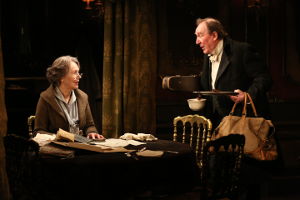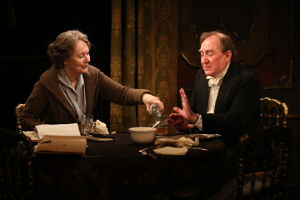|
“…that
endless tundra of aloneness”
"Afterplay"
October 2 – November 6
Presented by Irish Repertory Theatre
Irish Repertory Theatre, W. Scott McLucas Studio Theater
132 West 22nd Street, New York
Tues. + Thurs. 7 PM; Wed., Fri., Sat. 8 PM, Wed.+Sun. 3 PM
$50 General Admission, www.ovationtix.com,
212-727-2737
Reviewed by Beate Hein Bennett Sept. 30, 2016
Chekhov said somewhere that the greatest tragedies happen
around a dinner table. “AFTERPLAY,” a one-act play for
two characters by Brian Friel, is a dramatic variation on a theme
by Chekhov. In fact, the two characters-- a man and a woman—have
stepped out of two different Chekhov plays and been given a life extension.
Sonya is Uncle Vanya’s capable niece while Andrey is the feckless
brother of the Three Sisters. We meet the two of them in the 1920s
in some Moscow café of faded former elegance, some twenty years
after their original (fictional) existence. Thus “Uncle Vanya”
and “The Three Sisters” provide the fundamental backdrop
to Friel’s play.
 |
| Dearbhla Molloy and Dermot Crowley. Photo by
Carol Rosegg. |
Under the superb direction of the eminent Joe Dowling in the lovely
setting designed by John Lee Beatty with careful attention to period
detail and atmospheric lighting by Michael Gottlieb, the two actors,
Dearbhla Molloy as Sonya and Dermot Crowley as Andrey, perform together
a piece of theatrical magic akin to chamber music in its delicacy
of sound and contained movement. Friel gives them all the subtle pathos
of the Chekhovian characters—their longings, their foibles,
their proclivity to illusion—and their social failures, or rather
the social fabric that has come asunder already in Chekhov’s
world. Both, Chekhov and Friel are very subtle in their hints of the
socioeconomic circumstances that bring about the downfall of these
families; both writers implicate the outside world in the private
sphere of the characters. The impending doom of the estates and subsequent
poverty of the families is in Chekhov a constant source of anxiety
for the characters that are for the most part incapable of grappling
with practical problems or in denial. Friel’s two characters
are dealing with the consequences of the collective ineptitude and
experiencing actual poverty. Sonya and Andrey are middle-aged down-at-the-heel
failures hanging on to their existence with self-deprecating humor
and some falsehood or fables, as Andrey calls his lies, but above
all, with fortitude and courage, as Sonya keeps admonishing herself—and
the requisite swig of vodka. As I was intensely listening to the dialogue,
with the fact of chaotic 1920s post-revolutionary Moscow in my mind,
I was surprised that Friel did not give his characters any lines that
would reference the cataclysmic events of 1919. At most Sonya’s
comment about her love, Michael Astrov, the local doctor in “Uncle
Vanya” that “…those great social issues gradually
took over his life and he gave himself over to public things…”
is perhaps meant to suggest that greater history. However, neither
Andrey nor Sonya pursue this any further. What is clear from their
dialogue is that both have sunk to the bottom of their economic existence,
and all they can afford in the café is a glass of weak tea,
cabbage soup, and a slice of brown bread which they nurse in the course
of their seventy minute meeting. Beatty’s pre-revolutionary
environment of faded rococo wood paneling and soft little café
lights is Chekhovian but Friel’s characters struggle to maintain
their dignity in a world that is lost to them.
 |
| Dearbhla Molloy and Dermot Crowley. Photo by
Carol Rosegg. |
|

